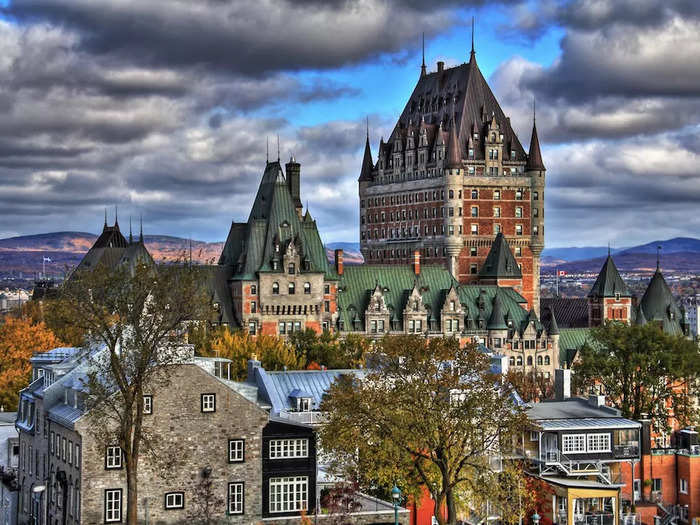- Home
- international
- news
- A step-by-step guide for moving to Canada and becoming a citizen there
A step-by-step guide for moving to Canada and becoming a citizen there
Marguerite Ward,Sarah Al-Arshani,Dan Latu

- Some Americans are talking about moving to Canada.
- The Canadian government has a tool that helps you figure out if you're eligible for citizenship.
If the US presidential election has you thinking about making a move to the US's northern neighbor, it is theoretically possible — but certainly not easy.
Gaining Canadian citizenship is tough. First, you need to become a permanent resident and have lived in Canada for three out of the last five years, among other requirements.
For those who want to head up north, here's how you become a permanent resident and citizen of Canada.
Preface: Make sure you're not already a Canadian citizen.

Before you go through the hassle of applying for citizenship or permanent residency, take a short quiz to see if you may already be Canadian.
The government outlines several caveats for being a citizen even if you weren't born there, many of which depend on your parents' citizenship. Maybe you secretly inherited their status at some point along the way.
Be at least 18 years old.

If you're not a legal adult, you've got an uphill climb ahead of you.
To become a citizen, minors need their parent or legal guardian to fill out the application for them and they need to already be permanent residents in Canada.
If a minor does not have a Canadian parent or a parent who is applying at the same time, they must also have been physically in Canada three of the last five years and file any income taxes.
Become a permanent resident.

The Canadian government created a handy tool to help you figure out if you're eligible to be a permanent resident, which is required to become a Canadian citizen.
There are several avenues available to becoming a permanent resident. For example, you can apply through a specific province, go down a special entrepreneur route, get help from a family member or spouse who lives in Canada, or go through Quebec, which has special immigration requirements.
Permanent residents are entitled to healthcare coverage and can work, study, and travel anywhere in Canada. You just can't vote, run for office, or hold some jobs with top security clearance.
If you're a skilled worker, consider Canada's Express Entry system.

Canada has a fast-track system for immigration called Express Entry. It's how skilled workers transition into a new role in the country.
All applicants into Express Entry are given specific scores based on their talents and job prospects and then ranked with other applicants. Those at the top of the rankings are invited to become permanent residents.
Examples of skilled workers include software engineers, dental assistants, or bakers, and typically require a college diploma or apprenticeship.
Declare your intent to reside.

If you're invited to become a permanent resident, you must confirm your plans to stay Canadian.
If you have not been in Canada for at least 730 days during the last five years, you could lose your permanent resident status and your chance to become a citizen.
If you don't live in Canada, you must work outside Canada as a public official known as a Crown servant or live abroad with certain family members who are Crown servants.
Spend enough time physically present in Canada.

Permanent residents don't always become citizens. The bar for citizenship is higher.
If you're living in Canada, you must have been a permanent resident and physically present in Canada for at least 1,095 days during the five years right before the date you sign your application.
In other words, your time in Canada needs to stay relatively consistent.
Provide your income tax filing.

Like the residence requirement, you must be able to provide three years' worth of tax returns in the five-year period leading up to the date of your application.
Basically, they want to see if your job is legit.
Speak English or French.

Along with dozens of other countries, Canada has two official languages: English and French.
To become a citizen, you need to know just one. You don't need to be fluent, just conversational enough to make small talk, give directions, use basic grammar, and know your vocab well enough to describe yourself.
You'll send along written documents with your application, but a citizenship officer will make the final call whether your English or French is up to snuff.
Know a thing or two about Canada.

You should probably brush up on your Canadian history anyway, but the government issues a formal quiz to applicants on the history, values, institutions, and symbols of Canada.
You take the test if you're between 16 and 64 years old. Typically, it's a written test, but the citizenship officer may also ask questions orally.
There are no real surprises. Everything you need to know can be found here: Discover Canada: The Rights and Responsibilities of Citizenship.
Know why your application might get denied.

There are a number of reasons your past may prohibit you from becoming a Canadian citizen.
For instance, the government looks down upon granting citizenship to people who have committed a crime within four years of submitting their application or are on trial for a crime.
Invest in durable clothes for your local climate.

Canada is the second-largest country on earth by total area, behind Russia. As such, there is no singular "Canadian climate," even if people may think it's just cold most of the time.
Depending on how close you live to the British Columbian coast, for example, spring can begin as early as February and summer temperatures can rise into the 90s.
So if you're looking for places to take up permanent residence, research what the weather's like. You won't waste money or space buying unnecessary items.
Take advantage of the customs of your new life.

Now that you've left your home country behind, embrace what makes Canada unique.
Many Canadians express deep fondness for Tim Hortons, quirky slang, celebrity ambassadors, and hockey.
No one will expect you to dive headfirst into this new world, but if you want to become a genuine citizen, formal requirements are only the start.
This story was last published on July 25, 2022, and most recently updated on November 5, 2024.
Chris Weller contributed to an earlier version of this post.
Popular Right Now
Popular Keywords
Advertisement